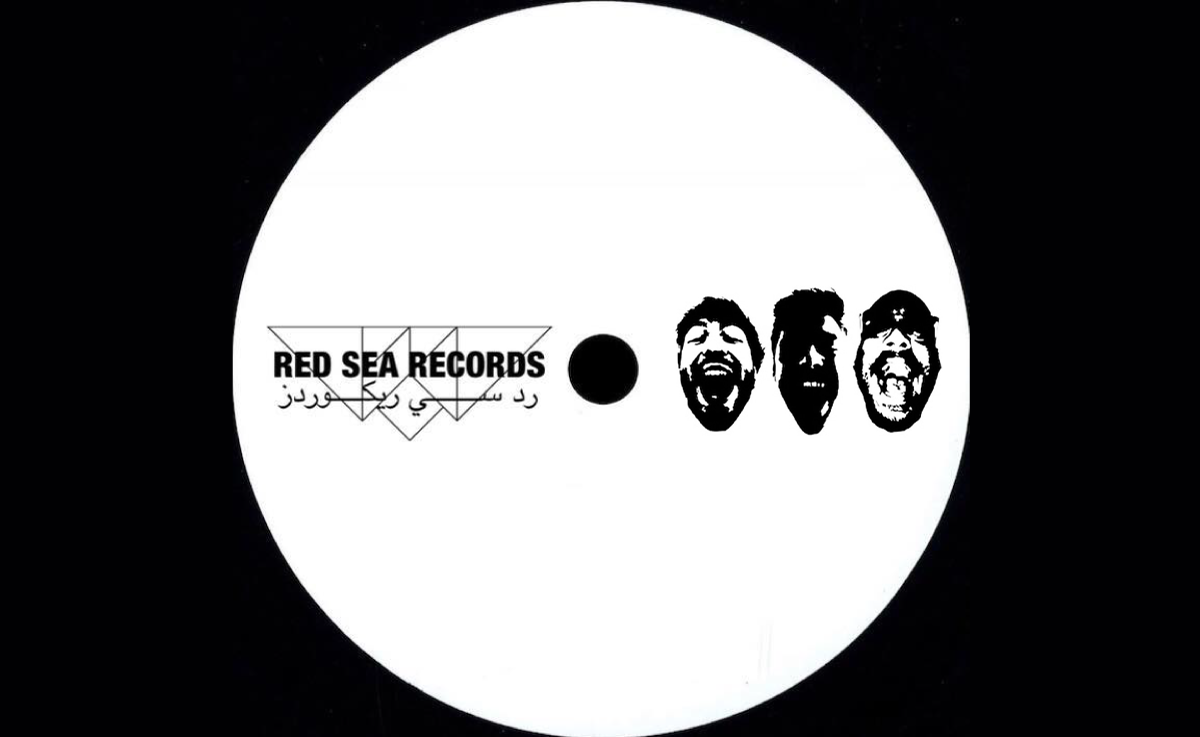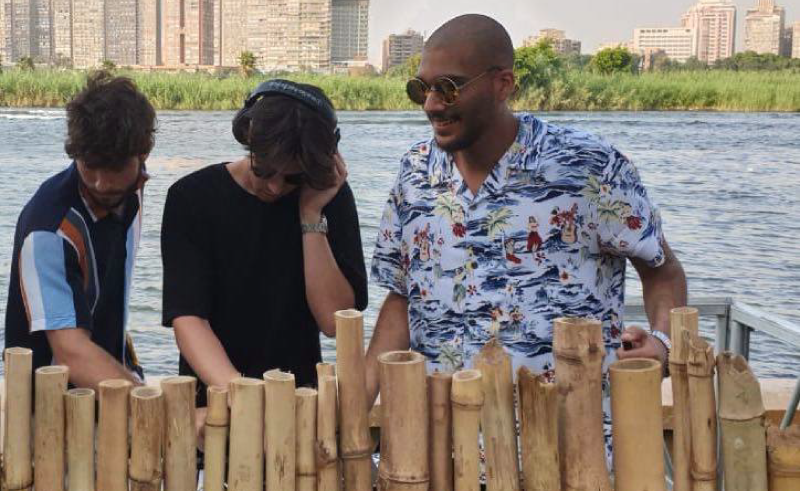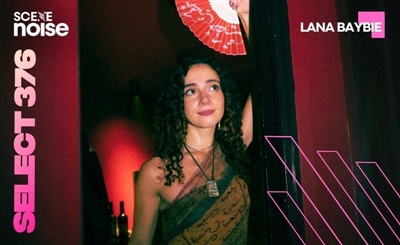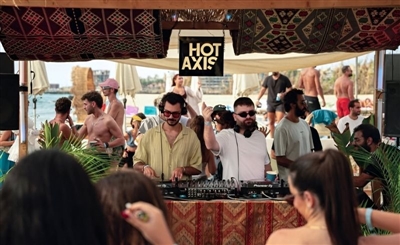Red Sea Records: The Egyptian Label Breathing New Life into the Ageing Local Techno Scene
SceneNoise’s Yaseen El Azzouni speaks to the trio of friends behind Red Sea Records - a still relatively young label that has already garnered a reputation for its relentless, hard-hitting, unapologetic techno music.

Red Sea Records has quickly become one of my favorite Egyptian-run labels focusing solely on hard-hitting, industrial techno. With a strict DIY work ethic and a number of highly polished releases under their belt, RSR has been relentlessly pushing to inject new life into Egypt’s ageing techno underground.
I caught up with RSR’s three founders, Karim Waguih, Omar Hosni and Karim Sadek, for a more in-depth take on their music and their vision for techno in Egypt.

I know you’re all based in different parts of the world right now - Toronto, London and Amsterdam - but take me through a brief background on how you came together as Red Sea Records.
Karim Sadek: We all go way back with music, individually. We've all been friends for a long time, but started getting into techno on our own. We've always been into electronic music and stuff. And then yeah, over the years, we’ve been doing our thing with our careers, we went to universities abroad and started participating in those local scenes.
When we came back together last summer, we found that the scene is picking up in Egypt and in the Middle East. There's a lot of potential. We know a lot of people in our circle who also have lots of potential, so we just thought, “why not provide a platform for all these people?”
Over time, we expanded it and thought, well, it doesn't really have to be just Middle East or Egypt, let’s provide a platform for all the sounds we like. We all went our separate ways and started working on it from within our own local scenes. We thought we can bring this sound everywhere. That's just where we stand right now, continuing to try to grow and expand. The whole time we're trying to keep a very open mind regarding the sound that we provide, and who we provide it to. We just want good techno and to be a platform for it.
<iframe width="100%" height="300" scrolling="no" frameborder="no" allow="autoplay" src="https://w.soundcloud.com/player/?url=https%3A//api.soundcloud.com/tracks/775261765&color=%23ff5500&auto_play=false&hide_related=false&show_comments=true&show_user=true&show_reposts=false&show_teaser=true&visual=true"></iframe><div style="font-size: 10px; color: #cccccc;line-break: anywhere;word-break: normal;overflow: hidden;white-space: nowrap;text-overflow: ellipsis; font-family: Interstate,Lucida Grande,Lucida Sans Unicode,Lucida Sans,Garuda,Verdana,Tahoma,sans-serif;font-weight: 100;"><a href="https://soundcloud.com/redsearecords1" title="Red Sea Records (RSR)" target="_blank" style="color: #cccccc; text-decoration: none;">Red Sea Records (RSR)</a> · <a href="https://soundcloud.com/redsearecords1/hayek-90s-klang-rsrp-8" title="HAYEK - 90's Klang [RSRP008]" target="_blank" style="color: #cccccc; text-decoration: none;">HAYEK - 90's Klang [RSRP008]</a></div>
Karim Waguih: We were all trying to get into the scene [in Egypt], and we found that it was hard to get into. So, we were basically just like “fuck it,” let's start our own thing, with our own people. Let's make a name for ourselves and not rely on other people, and it eventually started picking up some speed.
Omar Hosni: We were having these house parties [back in the beginning]. I guess those [parties] were kind of the main motivation as to why we wanted to perform music. It's just as simple as just calling a few people and being like, “yo, do you want to throw a party?”
I’d bring my mixer and speakers, and we'd have these long nights of just chilling and playing music. Eventually we thought, “why not bring that to more people?”
Karim Waguih: We started off RSR being open to a bunch of different sounds, not exclusive to one genre. Personally, I'm in sort of minimal/minimal house vibes, inspired by FUSE London. Karim [Sadek] and Hosni, and a lot of the other artists that we have onboard, are more down the techno route.
<iframe width="100%" height="300" scrolling="no" frameborder="no" allow="autoplay" src="https://w.soundcloud.com/player/?url=https%3A//api.soundcloud.com/tracks/823907638&color=%23ff5500&auto_play=false&hide_related=false&show_comments=true&show_user=true&show_reposts=false&show_teaser=true&visual=true"></iframe><div style="font-size: 10px; color: #cccccc;line-break: anywhere;word-break: normal;overflow: hidden;white-space: nowrap;text-overflow: ellipsis; font-family: Interstate,Lucida Grande,Lucida Sans Unicode,Lucida Sans,Garuda,Verdana,Tahoma,sans-serif;font-weight: 100;"><a href="https://soundcloud.com/kaamzs" title="kaamzs" target="_blank" style="color: #cccccc; text-decoration: none;">kaamzs</a> · <a href="https://soundcloud.com/kaamzs/its-called-schranz-155bpm" title="ITS CALLED SCHRANZ (155BPM)" target="_blank" style="color: #cccccc; text-decoration: none;">ITS CALLED SCHRANZ (155BPM)</a></div>
When did production come into the picture alongside throwing parties?
Karim Sadek: Production is actually a really big part of it. Obviously, there are a lot of mixes on our page right now. But we're starting to really focus on production. Right now, we’ve got this group going with a bunch of producers from everywhere — honestly — different places in the world. We're all sending each other stems and doing features together. In the coming weeks and months there's going t be a huge influx of production from all over the world, and one of our biggest goals to really showcase some interesting and weird productions from people that never had a platform. We're very excited to start showing that stuff.
Being Egyptian but mainly based abroad, do you feel like the crowds there have a certain expectation of what your sound is?
Omar Hosni: You know, here [in the Netherlands] there’s Rotterdam Rave, for instance. The main dude [running it] is Kareem Solomon; an Egyptian who came to the Netherlands and has been living here his whole life. He started by throwing illegal raves, and it’s now become one of the biggest festivals for the underground scene, in terms of really hard, industrial techno. So, I think [Europeans] kind of have an idea that Egyptians do have a sense in music, and all that. We have roots everywhere.
Karim Waguih: People shouldn’t have that mentality of: “my name is Arabic, so no one is going to listen to my shit in the western world.” That mentality doesn't make any sense, because if what you make is good it’s going to get the plays, no matter where you're from. You can be from a different planet for all anyone cares
Karim Sadek: When it comes to [talent] scouting, we're not limiting where we're going to get it from. A big part of our base is from Egypt and the Middle East, so naturally a big part of our uploads coming from that region. I think initially, we're going to really try to focus on making some noise in the scene in Egypt. That's where we want to make a name for ourselves when it comes to the events side of everything.
Karim Waguih: With Red Sea Records, we didn't really want to show that we're an Egyptian record label. Yeah, we're Egyptians running a record label, but it's not necessarily an ‘Egyptian’ record label.
How do you usually handle releases, like Hayek’s new EP for example?
Omar Hosni: Hayek is a friend of mine, but I only I met him recently. He started producing a while ago and we've just been in contact, sending each other releases, trying to get a constant feedback loops. He just put out these crazy, crazy songs and was like, “do you guys want to release it?”
We were like, “of course!”
<iframe width="100%" height="300" scrolling="no" frameborder="no" allow="autoplay" src="https://w.soundcloud.com/player/?url=https%3A//api.soundcloud.com/playlists/1042811329&color=%23ff5500&auto_play=false&hide_related=false&show_comments=true&show_user=true&show_reposts=false&show_teaser=true&visual=true"></iframe><div style="font-size: 10px; color: #cccccc;line-break: anywhere;word-break: normal;overflow: hidden;white-space: nowrap;text-overflow: ellipsis; font-family: Interstate,Lucida Grande,Lucida Sans Unicode,Lucida Sans,Garuda,Verdana,Tahoma,sans-serif;font-weight: 100;"><a href="https://soundcloud.com/redsearecords1" title="Red Sea Records (RSR)" target="_blank" style="color: #cccccc; text-decoration: none;">Red Sea Records (RSR)</a> · <a href="https://soundcloud.com/redsearecords1/sets/commencement-ep" title="Commencement EP" target="_blank" style="color: #cccccc; text-decoration: none;">Commencement EP</a></div>
That's how things went with Hayek’s EP, but when we started off, we got our first few releases through Reddit. Reddit has a great community, people are always interacting, they're always active. Kareem Sadek wrote a post that was like, “yo anyone interested, we have a record label,” and we got a decent amount of applications. We just went through them, and saw what fit in terms of mixing, mastering. We also didn’t want to be too strict, because at the end of the day, we're not the best out there yet. We're still growing and we'd like to grow [alongside the] people around us.
Karim Waguih: Reddit is a great platform in general.
Karim Sadek: Just putting my songs online and seeing them ripped apart by people telling me “you got to do this…”
I wouldn't have reached the level I’m at without that [feedback].
Do you see yourselves focusing more on Egypt when the situation that we're in lifts, and things are a bit more open?
Omar Hosni: Definitely. I feel like we've been just building our kind of image these few months. Our goal for this year was like, “this year is going to be big. This year, we're going to start getting some releases, getting some heat.”
Once we're back, we [were planning to] actually start hosting our own parties, whether they were small or with a bigger group than we usually used to. Then we'll at least be able to start showing who we are. Once everything starts settling down, we hope to do some fire stuff.
What sort of reception have you been getting on these new releases?
Karim Sadek: It's honestly been more than we thought. For a long time, it would just be the people we brought in and their circles. Now, people we don’t know stumble on the page, and go out of their way to hit us up. I think the reception has been really good, considering that, right now, we aren't even that big. We're still growing.
Is it difficult to separate the feedback of friends from other sources of support or criticism?
Omar Hosni: We were literally fighting about that these past few days. We were discussing how we need to realise at some point that some friends are just doing it for the support. But like Kareem said, we started getting posts from people we don't know, a lot of plays and likes from people all over the world that we never expected to even be following us.
<iframe width="100%" height="300" scrolling="no" frameborder="no" allow="autoplay" src="https://w.soundcloud.com/player/?url=https%3A//api.soundcloud.com/tracks/790192789&color=%23ff5500&auto_play=false&hide_related=false&show_comments=true&show_user=true&show_reposts=false&show_teaser=true&visual=true"></iframe><div style="font-size: 10px; color: #cccccc;line-break: anywhere;word-break: normal;overflow: hidden;white-space: nowrap;text-overflow: ellipsis; font-family: Interstate,Lucida Grande,Lucida Sans Unicode,Lucida Sans,Garuda,Verdana,Tahoma,sans-serif;font-weight: 100;"><a href="https://soundcloud.com/redsearecords1" title="Red Sea Records (RSR)" target="_blank" style="color: #cccccc; text-decoration: none;">Red Sea Records (RSR)</a> · <a href="https://soundcloud.com/redsearecords1/kaamzs-maybeiainttheshit-rsrp010free-dl" title="kaamzs - MaybeIAintTheShit [RSRP#010/FREE DL]" target="_blank" style="color: #cccccc; text-decoration: none;">kaamzs - MaybeIAintTheShit [RSRP#010/FREE DL]</a></div>
Karim Sadek: The scene is definitely growing in Egypt. Everyone that has been in it for a while is realising “oh, there's more popping up, where it used to just be like a thing here and there.”
As the scene grows, we're going to start having high expectations and a lot of musicians are going to fall off if they don't start trying to grow themselves as artists, or trying to discover new things, do new things, or just get out of the bubble that the that the scene has been in for a couple of years now.
Karim Waguih: We hope to see more fresh faces get into the scene and more artists get what they deserve. There are a lot of artists in Egypt that have been making really, really big moves.
This kid called Fady, for example, just had his track played by Nina Kravitz the other day, but nobody in Egypt knows him. He's trying to get his name out there and I just hope that — for the future of the scene in Egypt — people recognise these talents more, instead of shutting them down without giving them a chance. Once that happens, once we look past the number of followers that you have and all that kind of stuff, the scene will develop into something beautiful, hopefully.
Omar Hosni: Yeah, there's so much potential in the scene. We’ve got the venues, the number of artists, so much other crazy nightlife, [and] open people.
Karim Waguih: In Egypt, I think ‘the scene’ that everyone's talking about hasn't really fully developed. It's gradually growing, still finding its way.
Karim Sadek: It’s also not always about the music, which is what it should be.
Omar Hosni: If you want to compare it to abroad, for example, when you go to a party, everyone's smiling. Yeah, they're probably on a shitload of drugs but — that aside — they still enjoy the music. They're there to have fun. But in Egypt there are things holding it back from becoming an open community, where everyone's trying to expand and grow together. There’s an attitude of “I want to grow and I want to see [the scene] grow on my terms,” which is terrible, in my opinion.
Karim Sadek: With techno specifically, there's a really special mindset that supports the whole experience for everyone. People have to go in open-minded, not judging people for whatever they're doing, however they're dancing, who they're with, [or what] they're doing with the people they're with. But it's hard to fully implement that mindset in Egypt, considering the culture. But I feel like more people are going to accept it as newer generations become a bit more open to different things and realise that other people's actions don't affect their life and what they do.
<iframe width="100%" height="300" scrolling="no" frameborder="no" allow="autoplay" src="https://w.soundcloud.com/player/?url=https%3A//api.soundcloud.com/tracks/717921991&color=%23ff5500&auto_play=false&hide_related=false&show_comments=true&show_user=true&show_reposts=false&show_teaser=true&visual=true"></iframe><div style="font-size: 10px; color: #cccccc;line-break: anywhere;word-break: normal;overflow: hidden;white-space: nowrap;text-overflow: ellipsis; font-family: Interstate,Lucida Grande,Lucida Sans Unicode,Lucida Sans,Garuda,Verdana,Tahoma,sans-serif;font-weight: 100;"><a href="https://soundcloud.com/redsearecords1" title="Red Sea Records (RSR)" target="_blank" style="color: #cccccc; text-decoration: none;">Red Sea Records (RSR)</a> · <a href="https://soundcloud.com/redsearecords1/red-sea-records-resident-mix-kaamzs-rsrrm-4" title="Resident Mix #4 'kaamzs' [RSRRM004]" target="_blank" style="color: #cccccc; text-decoration: none;">Resident Mix #4 'kaamzs' [RSRRM004]</a></div>
Do you have any advice for even newer people trying to get into the music scene?
Karim Waguih: For any upcoming DJ, or anyone who wants to get their name out there, you need to realise that it’s a marathon not a sprint at the end of the day. When we sent out emails and people didn’t reply [at first], it didn’t’ mean that they were never going to reply.
Omar Hosni: When I started — and I’ve been mixing for 5-6 years now — I wanted someone to tell me whether what I was doing was good or not. I sent people [in Egypt] my stuff, expecting a response, just to find out what level I’m at. Most of the time I didn’t get anything back (laughs), and that put me off as an artist to share my own music. I feel like something that Karim Sadek did a lot better than I did, in that he never stopped [releasing music] when he didn’t get a response.
Everyone in the scenes [abroad] is really friendly. Even if your stuff is really bad, someone is going to respond to you and be like, “yo man you need to do this, this, this and this” and “please let me know if you need help with anything.”
Over there that’s normal, but I couldn’t find this [type of support] in Egypt.
Karim Sadek: People in Egypt hold grudges, without any real reason. Even if you’re talking in the most peaceful way like, giving feedback — not criticism — you could get punched in the face.
Y: Doing the sort of things you’re doing with RSR, it definitely helps being friends as well, right?
Omar Hosni: Definitely. Being friends is what makes it, at the end of the day. Even if we have an argument, were still friends. We’ve been together long enough to know we want what’s best for us
Karim Sadek: We’re all on the same page. If one thing goes to shit, we all go to shit.
What’s coming up next?
Karim Sadek: We’re doing a remix competition for one of the tracks on Hayek’s EP, and going to announce the details soon. We’ll have a big reveal for the winner, who’ll also get to do a release with us. We’re open to all demos as well, if anyone wants to send us music please do at redsearecordsbom@gmail.com!
Follow Red Sea Records on Soundcloud, Instagram and Facebook.
- Previous Article test list 1 noise 2024-03-13
- Next Article Sudanese Rap Collective The C!rcle Take Things ‘Way Back' with Nostalgic New Single
Trending This Month
-
Jan 29, 2026






















